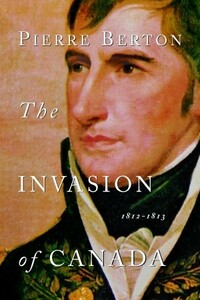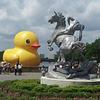Take a photo of a barcode or cover
I remember falling asleep in my Canadian History classes in Elementary and High School. If only they had made it as interesting as Pierre Burton does in these books. Not just a dried up memorization of dates and names of people I couldn't care less about. Mr. Berton's books bring the conflict and all it's intrigue to life! My brother-in-law who got his PHD in Canadian history blah blah blah, poo-poos these books. I think he mistakes the strength of these books. To bring Canadian History to life for people who don't want to take classes in it in University, is a gift. Like how Carl Sagan brought the universe to life for us layman who struggle with math, in the 1980's. It's not historical fiction. It's history from the perspective of the people who lived it.
dark
funny
informative
reflective
fast-paced
One of the most entertaining history books I've had the pleasure to read. Berton does an excellent job of relaying fact and much uncommonly known history in story fashion. This book is worth a read, and many who do read will find much new information that is not taught in America high school history.
It's always interesting to learn a little history that you didn't even know existed for your own country. I never knew that the US tried to invade Canada during the War of 1812, which was not Canada as we know it now, but British territories, including an area known as Upper Canada. So it makes sense that this would happen in a war against the British, but until I saw this book I'd never heard of these battles. Unfortunately the book highlights one stupid mistake after another and misplaced braggadocio, especially on the US side, so it actually becomes tedious. I like that the author uses multiple historical sources to give you the perspective of all sides and levels of standing, from commanders to common volunteers. He also does a good job in highlighting the major roles the Native Americans played in these battles, mostly siding with the British after the US massacre of women and children at the "battle" of Tippecanoe. Even so, they are clearly looking out for their own interests during the whole engagement and the British/ Canadians are mostly aware of this. The history of Tecumsah and the Prophet is fascinating, as he worked tirelessly to unite the men of various tribes to fight for their interests when facing the land-hungry Americans. Definitely worth reading and better understanding some of the earliest American history.
challenging
informative
medium-paced
Certainly a 'product of its time' - that being said, I do appreciate Berton's expression of regret at the lack extant [written] indigenous records or material; however, that doesn't mean that these narratives can then be fabricated or otherwise illustrated with clearly biased or racist colonial accounts. While Berton does try to give the indigenous their due credit - it is unlikely British/Canadian forces would have 'won' without them - this is undermined by his penchant to paint as 'civilized' (European) leaders like Tecumseh. If you're looking for a factual account of these events, look elsewhere.
“Peace, Order and Good Government” or “Life, Liberty and the Pursuit of Happiness”
“The key words in Upper Canada were “loyalty” and “patriotism” – loyalty to the British way of life as opposed to American “radical” democracy and republicanism.”
Pierre Berton’s THE INVASION OF CANADA is a colourful, in depth and very much grass roots telling of the story of the first two years of the War of 1812, a war that nobody really wanted, a war that didn’t really have a reason for happening, and a war that nobody really won. The USA’s declaration of war, (on England, mind you, not on Canada directly – at that time, after all, Canada hadn’t even come into official existence as a country) was a result of England’s heavy-handed, unreasonable restriction on maritime trade between the USA and Europe. The USA’s extension of that war into Upper Canada only happened after Britain had relaxed those restrictions but early 19th century communication being less than high speed or eminently reliable, the military of both countries were unaware that their cause for war had vanished.
Such nationalism as this Canadian reader has always bubbles to the surface in the face of the much more typical flag-waving and jingoistic version of patriotism exhibited by typical Americans. So it’s hard not to be a little smug when one is reading about the shellacking that general Isaac Brock, the Canadian regular military, the militia and their aboriginal allies under Tecumseh and Joseph Brant gave to the apparently overwhelming numbers and the much-vaunted military might of the USA. The American certainty that this war would be a short-lived pro forma affair was certainly crushed under the losses, nay disgracing losses, incurred at Michilimackinac, Detroit, Amherstburg, Queenston Heights, and Frenchtown. BUT It would also be shameful for any rational reader to not be embarrassed and deeply sorrowed by the historical (and continuing current) treatment accorded by the Roman Catholic Church and the Canadian government to those aboriginal First Nations when it is equally obvious that, without their assistance, that USA walkover of a nascent Canada would have been a drop dead certainty.
It is worth reproducing Berton’s closing observation in its entirety:
The “attitude – that the British way is preferable to the American; that certain sensitive positions are better filled by appointment than by election; that order imposed from above has advantages over grassroots democracy (for which read “licence” or “anarchy”); that a ruling elite often knows better than the body politic – flourished as a result of an invasion repelled. Out of it, shaped by an emerging nationalism and tempered by rebellion, grew that special form of state paternalism that makes the Canadian way of life significantly different from the more individualistic American way. Thus, in a psychological as well as in a political sense, we are Canadians and not Americans because of a foolish war that scarcely anyone wanted or need, but which, once launched, none knew how to stop.”
The final two years of this travesty and the “conclusion” of the war are described in Berton’s FLAMES ACROSS THE BORDER. Definitely recommended to those who enjoyed well-written history that is anything but the oft-encountered turgid litany of dates, places and events.
Paul Weiss
“The key words in Upper Canada were “loyalty” and “patriotism” – loyalty to the British way of life as opposed to American “radical” democracy and republicanism.”
Pierre Berton’s THE INVASION OF CANADA is a colourful, in depth and very much grass roots telling of the story of the first two years of the War of 1812, a war that nobody really wanted, a war that didn’t really have a reason for happening, and a war that nobody really won. The USA’s declaration of war, (on England, mind you, not on Canada directly – at that time, after all, Canada hadn’t even come into official existence as a country) was a result of England’s heavy-handed, unreasonable restriction on maritime trade between the USA and Europe. The USA’s extension of that war into Upper Canada only happened after Britain had relaxed those restrictions but early 19th century communication being less than high speed or eminently reliable, the military of both countries were unaware that their cause for war had vanished.
Such nationalism as this Canadian reader has always bubbles to the surface in the face of the much more typical flag-waving and jingoistic version of patriotism exhibited by typical Americans. So it’s hard not to be a little smug when one is reading about the shellacking that general Isaac Brock, the Canadian regular military, the militia and their aboriginal allies under Tecumseh and Joseph Brant gave to the apparently overwhelming numbers and the much-vaunted military might of the USA. The American certainty that this war would be a short-lived pro forma affair was certainly crushed under the losses, nay disgracing losses, incurred at Michilimackinac, Detroit, Amherstburg, Queenston Heights, and Frenchtown. BUT It would also be shameful for any rational reader to not be embarrassed and deeply sorrowed by the historical (and continuing current) treatment accorded by the Roman Catholic Church and the Canadian government to those aboriginal First Nations when it is equally obvious that, without their assistance, that USA walkover of a nascent Canada would have been a drop dead certainty.
It is worth reproducing Berton’s closing observation in its entirety:
The “attitude – that the British way is preferable to the American; that certain sensitive positions are better filled by appointment than by election; that order imposed from above has advantages over grassroots democracy (for which read “licence” or “anarchy”); that a ruling elite often knows better than the body politic – flourished as a result of an invasion repelled. Out of it, shaped by an emerging nationalism and tempered by rebellion, grew that special form of state paternalism that makes the Canadian way of life significantly different from the more individualistic American way. Thus, in a psychological as well as in a political sense, we are Canadians and not Americans because of a foolish war that scarcely anyone wanted or need, but which, once launched, none knew how to stop.”
The final two years of this travesty and the “conclusion” of the war are described in Berton’s FLAMES ACROSS THE BORDER. Definitely recommended to those who enjoyed well-written history that is anything but the oft-encountered turgid litany of dates, places and events.
Paul Weiss
My mom has been pestering me to read Pierre Berton's books for many years. I can see why he's a favorite among Canadians and history lovers in general. He strung together dozens of sources and put them in a narrative that reads fast, full of character and characters, ground-level perspective that allows for an intimate understanding of the underlying events behind the North American War of 1812, yet weaves in vocabulary lessons.
Unlike my American history classes (I grew up in the U.S.), I'll remember the stories within this book whether it's General Brock's gutsy strategy at Fort Detroit, the living conditions for the poorly prepared American soldiers, General Hull who surrendered to spare lives but was tried for treason because of it, or the named individuals who were captured by the Natives.
Much of the book follows the American perspective and all the blunders that came from enthusiasm and no discipline, no planning, and leadership based on popularity (generals reliving their revolutionary glory days) instead of skill. The most horrendous events that year were done to themselves.
The modern Canada exists thanks to the War of 1812. Before this conflict there was no effective border between Upper Canada and the United States. Most Canadians were also Americans, but lived in a more dispersed region. Most Canadians had no interest in war. Americans thought it would be easy to annex Canada and irk back the British for blocking trade with continental Europe. In her interest to be left alone to mostly farm instead of being the neutral battle ground for two powerful nations, Canada had the chance to look at herself and look at her two most associated countries: how was Canada different? What traits from either country did Canada matter? For a Canadian, what was loyalty and patriotism? In the first year of this ill-thought out war, one can see how Canadians always had a more peaceful mindset than their southern cousins, but also had the superior leadership of Isaac Brock (page 313):
"He came to represent Canadian order as opposed to American anarchy - 'peace, order and good government' rather than the more hedonistic 'life, liberty and the pursuit of happiness.' Had not Upper Canada been saved from the invader by appointed leaders who ruled autocratically? In America, the politicians became generals; in British North American, the opposite held true."
Unlike my American history classes (I grew up in the U.S.), I'll remember the stories within this book whether it's General Brock's gutsy strategy at Fort Detroit, the living conditions for the poorly prepared American soldiers, General Hull who surrendered to spare lives but was tried for treason because of it, or the named individuals who were captured by the Natives.
Much of the book follows the American perspective and all the blunders that came from enthusiasm and no discipline, no planning, and leadership based on popularity (generals reliving their revolutionary glory days) instead of skill. The most horrendous events that year were done to themselves.
The modern Canada exists thanks to the War of 1812. Before this conflict there was no effective border between Upper Canada and the United States. Most Canadians were also Americans, but lived in a more dispersed region. Most Canadians had no interest in war. Americans thought it would be easy to annex Canada and irk back the British for blocking trade with continental Europe. In her interest to be left alone to mostly farm instead of being the neutral battle ground for two powerful nations, Canada had the chance to look at herself and look at her two most associated countries: how was Canada different? What traits from either country did Canada matter? For a Canadian, what was loyalty and patriotism? In the first year of this ill-thought out war, one can see how Canadians always had a more peaceful mindset than their southern cousins, but also had the superior leadership of Isaac Brock (page 313):
"He came to represent Canadian order as opposed to American anarchy - 'peace, order and good government' rather than the more hedonistic 'life, liberty and the pursuit of happiness.' Had not Upper Canada been saved from the invader by appointed leaders who ruled autocratically? In America, the politicians became generals; in British North American, the opposite held true."
I picked this one up hoping to learn a bit more about the War of 1812, and this came highly recommended.
I can see why- it's very people focused, and the style is fairly engaging considering the subject matter. I also enjoyed reading a book from the Canadian perspective on the war.
However, it just didn't wind up sucking me in, and while I went in knowing this was the first of a two volume series, it still felt really unfinished at the end. The whole book felt a bit like the intro to a longer work, rather than something complete in itself.
I can see why- it's very people focused, and the style is fairly engaging considering the subject matter. I also enjoyed reading a book from the Canadian perspective on the war.
However, it just didn't wind up sucking me in, and while I went in knowing this was the first of a two volume series, it still felt really unfinished at the end. The whole book felt a bit like the intro to a longer work, rather than something complete in itself.
I did enjoy this book, even though it is now something like 40 years old. I also found myself reluctant to trust Burton completely and I find myself, a Canadian citizen living in the United States interested in the different stories of who “won” the War of 1812. I also find my perspective changed by learning more of the history of the United States and less solid in my certainties instilled by Canadian curricula and “common knowledge” about history.
Burton’s account was quite readable, though definitely for a lay audience: in the body, he tells what he believes happened and doesn’t muddy it up much with the where, how, and whys of particular sources and how he chose between conflicting accounts. It made the reading easier at the expense (to my mind) of its credibility, especially since I know this war is seem very differently in the two countries.
Burton’s account was quite readable, though definitely for a lay audience: in the body, he tells what he believes happened and doesn’t muddy it up much with the where, how, and whys of particular sources and how he chose between conflicting accounts. It made the reading easier at the expense (to my mind) of its credibility, especially since I know this war is seem very differently in the two countries.




